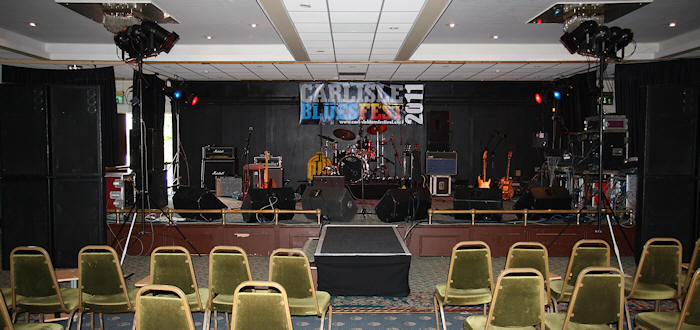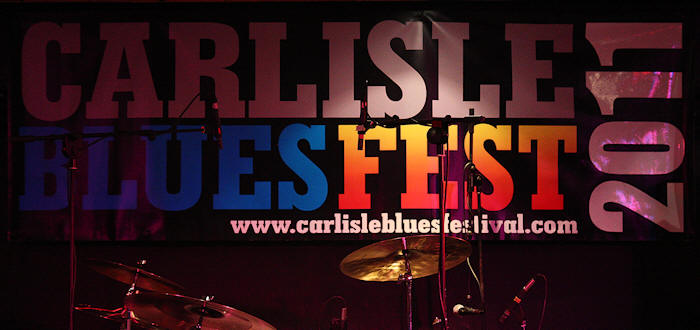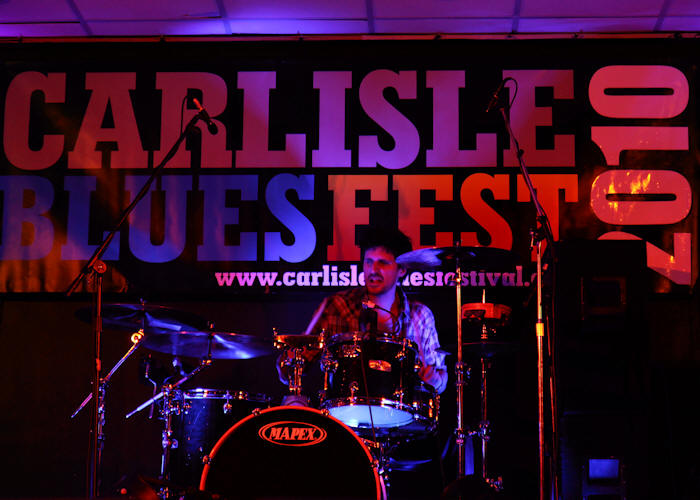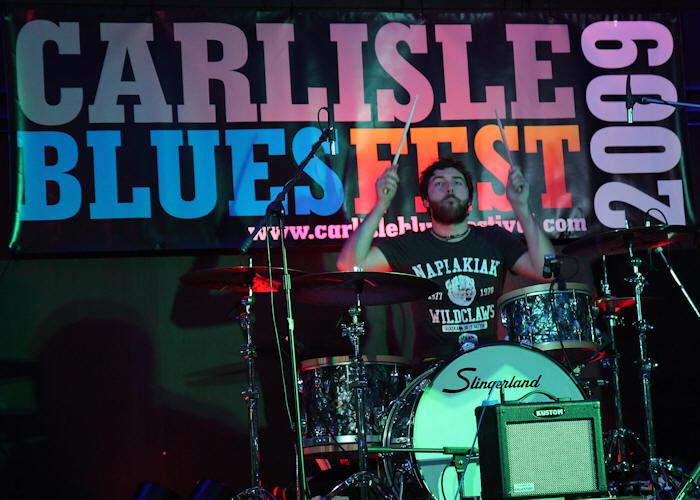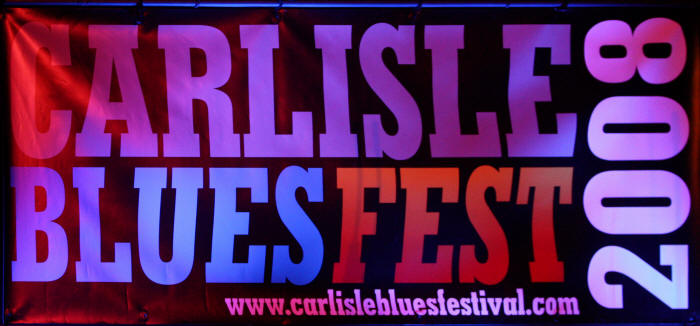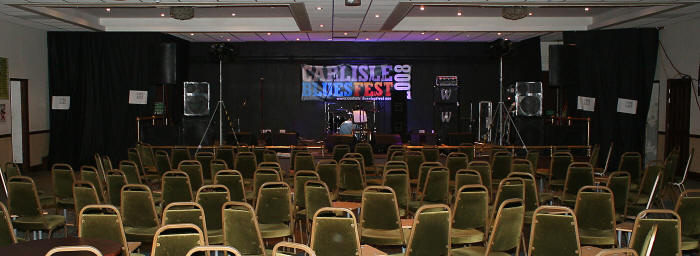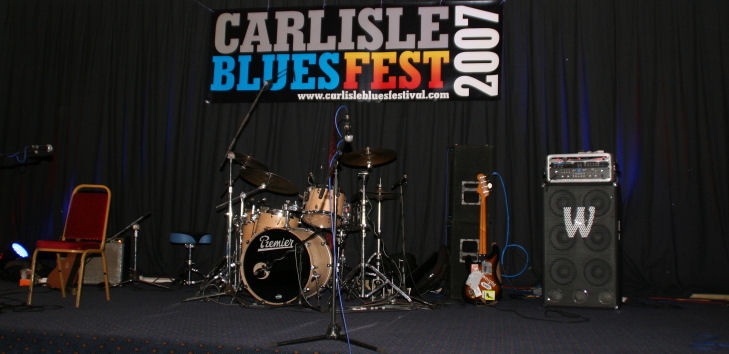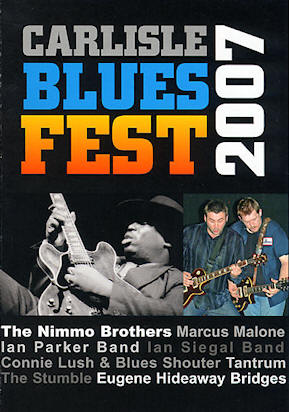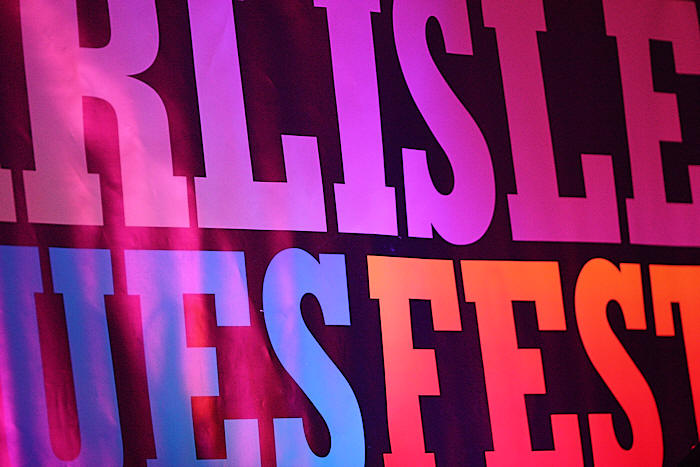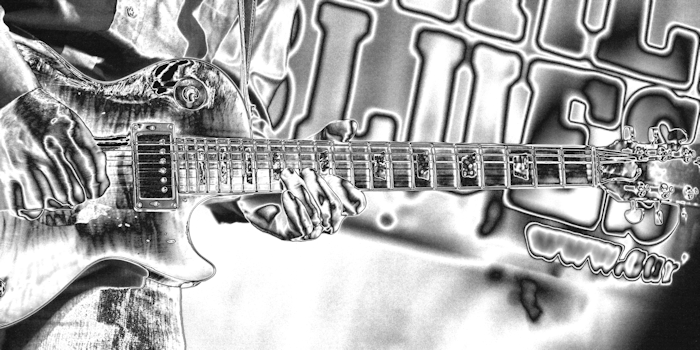
Painting © 2004 Loz
Arkle
Website
© Copyright 2000-2011 Alan White - All
Rights Reserved
Site optimised for Microsoft Internet Explorer
Early Blues Interview
|
|
"... no praise
can do justice to the superlative efforts of organiser Nick Westgarth
and his tireless team of supporters, to whom a great vote of thanks and
congratulations are owed by those of us who were lucky enough to be
there".
www.carlislebluesfestival.com Alan: Nick, where do you come from? Nick: Penrith, just down the road and I lived there until I moved up to Carlisle about 5 years ago. Alan: So what are your first musical memories growing up there? Nick: I loved the Beatles when I was very young and I remember collecting all their memorabilia. Then I got onto Black Sabbath because at school it was either blues-rock or soul.
Nick: No, not at all. I started playing drums when I was about 17 but I didnít play very long or very well. I did a bit of roadying for bands so Iíve been associated for a long time. Alan: So whatís your favourite type of music? Nick: Well, it changes but it was always very much pop, and then I got into rock and it was rock for a long time. Then I went to Maryport Blues Festival, I think it was the second one, because they had Whitesnake on albeit under a different name. I had no interest in blues at that time but the Nimmo Brothers absolutely blew me away. After that night I really wanted to see them again and I found out that they were on at a little pub, The Black Bull in Blaydon, but it was sold out, so I really pestered and pestered the guy with the tickets and eventually he got me a ticket and I went over. I just loved the venue and the music, they were putting on all the bands I now know, like Connie Lush, the Night Porters, Ian Parker, Aynsley Lister, the Nimmos, they were all on so I started going quite regularly and got friendly with the guy who ran it, Keith Latimer. At one of the Christmas Parties, Dave Saunders from The Producers asked me why I was travelling so far and I said, ďThereís nowhere near where I live to see these bandsĒ, so he said ďWell, do it yourselfĒ. I laughed but he was really helpful and said that they would come and do a gig for me. The first one I did was The Nimmos and then Dave Saunders and it took off from there and Penrith was successful for 7 or 8 years. Alan: So what was the attraction of getting involved in organising the events, apart from not having to travel? Nick: I really enjoyed the involvement with the musicians, and it was a challenge at the time and something to try. Alan: Looking at the events youíve organised you must have some stories to tell? Nick: Whenever we had Nicky Moore at Penrith, and he was there 3 or 4 times, something happened. This one time heíd done his first set and he came off looking really ill, I thought he was going to have a heart attack but he insisted on going back on and doing his second set and after that I really thought he was having a heart attack and he promised me heíd go to the hospital, but apparently he didnít and then two days later he collapsed in the gym and was rushed into hospital. The next time he came he crashed his car on the way home and broke some ribs. Alan: What inspired you to start the Carlisle Blues Festival? Nick: When I was doing Penrith I always felt that I could do a festival, and always wanted to. No real reason other than the challenge of doing something bigger. When I moved to Carlisle I met a guy doing a similar sort of thing here to what I was doing in Penrith so we thought about putting a weekend together so we put the first one on and it was quite successful. But the guy I was doing it with, Chris, was working away a lot during the week and I seemed to end up doing most of it, so when we thought about doing a second one I said that I was turning away paid work in order to organise it so Iíd need to pay myself for the time, but he decided he was too busy and it was better for me to do it myself. Alan: The festival has been tremendously successful right from the start and other festival organisers do see it as a role model. What do you think is the recipe for success? Nick: A lot of hard work. Seriously, hard work and attention to detail and a lot of hours. I wouldnít recommend it to anybody! But thereís usually nobody else to do it so I just have to. The Festival is fighting above itís weight and itís pretty obvious that itís doing so because thereís no financial support and the size of the venue limits the number of people I can get in, but I canít charge a fortune. Consequently the outlay of the festival is too great for what the income is, so the only way I can get around that is for me to take on every role. I donít hire accountants, I donít hire people to produce artwork, I donít pay people to draw up contracts, I just do everything myself as I feel thatís the only way I can run at this level without some kind of financial backing. Alan: Organising the festival must be an all-round annual activity. Give us a snapshot of the annual cycle. Nick: Weíve just finished the festival now so Iíve got a few weeks work pulling all the accounts together, tracking the budget, adjusting the budgets for next year. Alan: How do you go about selecting the artists? You always get such a wonderful balance. Nick: I do put a lot of thought into it and into having the flow through the weekend. Itís gratifying that people have started to pick up on that and comment on how nice the flow is. Obviously I go to quite a number of other events and see bands so I take note of who would work and where. I try to put on a variety so thereís something for everybody, although I couldnít possibly put on a festival whereby everybody likes every artist. But if thereís a band that somebody doesnít quite take to then thereís still no denying that theyíve been top quality at what they do. I almost always try to watch the bands myself rather than just booking them based on CDs or publicity. Alan: What artists and bands perform what, in your opinion, makes a good set? Nick: Difficult question! I think the good bands understand the audience and understand how to entertain. I suppose another of my selection criteria has to be that the band entertains, in whatever way they do it. The bands that get it right understand how to work their way through the set. Alan Nimmo tonight did a set that lifted the audience, then took them down, then up again, just sheer professionalism. You get plenty of good bands, with a good sound, but no thought of how they structure their set. Alan: Tell me about the stage and lighting crews at Carlisle, how did you choose them? Nick: They go back a long way, right back to the days at Blaydon. The guy who ran Blaydon unfortunately had an aneurism and died very suddenly and it was at his funeral that I met the sound guys and started talking to them about coming over to help at the Penrith gigs. Up to that point at Penrith we were using a small house PA, a tiny mixing desk and a guy who was very enthusiastic but amateur running events like the Nimmo shows. God knows how it worked, Iíd never even consider doing anything like that now, My God, how we got away with that I do not know. So I was at the stage of getting really good bands and realised I had to lift my game so it was at that stage that I got Colin Rowell involved and he did quite a few shows with me. But then he was working on a Channel 4 TV show in London so and I hired Nigel from Workington so he did the rest at Penrith and the Festivals until this year. Colin has done the stage production for me since the 2nd Festival. That was another steep learning curve because I tried to do the stage management myself at the first Festival and I realised very quickly that I needed a stage manager, it just wasnít my bag. I knew Colin had done the stage management for The Tube on TV so I got him involved which was probably the best move I ever made for the festival. Heís an absolutely fantastic stage manager and I just trust him completely, as I do all my stage crew. I knew Colin had a production company but I had loyalty to Nigel so they worked separately for a few years but this year I just needed to consolidate it all to free me up and so asked Colin to manage all the stage including lights, production, sound. Alan: Tell me about a typical festival day for you. Nick: This year, I have really tried to get to the Festival and hope that my work is done. Iíve got all the right people in the right places and itís taken months of detailed planning Ė although it didnít work quite as well as Iíd expected! On the first day, itís up early, sorting out late tickets, constant phone calls and emails, making sure all the right people are in the right areas to pull it all together, making sure that all the build is going to plan, all the bands are arriving at different times, getting the first band on. My job on the day is just to do whatever needs doing. Itís taken four years to get to this stage but Iím always looking to see what can be done better. Alan: Youíve got an army of helpers, dedicated people who must also be working a hell of lot. Nick: They're fantastic. Iíve pulled the crew together over a few weeks and it needs some explanation and training, for example explaining my spreadsheets and the online sales system to the girls on the door, doing quite a few 'recces' with the sound crew over in Newcastle, lots of little satellite meetings to pull it all together. Alan: You mentioned earlier that you donít get any sponsorship and it must be very difficult to do all this without any backing. Nick: To me, if a festival canít be self-financing then Iím not sure if it should be running. It is a big financial risk for me, the bands arenít cheap, the sound systems are expensive, so it does irritate me a bit when I see festivals pulling out or gigs being cancelled because of ticket sales. Iíve never sat back and expected people to just buy. If youíre a promoter, youíve got to promote, not just sit back and wait. Alan: Thereís a lot of government support for blues festivals in Europe but there doesnít seem to be much in the UK. Nick: No, there isnít and, of course now they are cutting budgets for Arts. But I still think that if people are putting something on and they canít sell tickets then they either arenít promoting it or there isnít a market for it. Itís pretty fundamental stuff really. Alan: The 6th Carlisle Blues Festival in 2012. Can we book it in our diaries now? Nick: I donít know, I just donít know. Itís a good festival, itís a good product, I know it is but itís a small festival with only 400 people to fill the room and this year I didnít sell all the tickets on Friday or Sunday. So I have to sit back and wonder why. Is it on the decline? Are the bands Iím putting on not good enough? Okay, so we have an economic decline as well but at the end of the day I have to reflect and think about next year. It takes 11 months of my life and I need to sell 400 tickets. That's the reality. People always say they really enjoy it but I need them to come in bigger numbers. Alan: All I can say is, it was a fantastic festival and I know everybody who was here enjoyed it and I really hope we get the 6th festival Thank you for all your hard work Nick. Nick: Thank you very
much Alan.
Check out Carlisle Blues Fest
11 photos _________________________________________________________________________
Return to
Blues Interviews List |








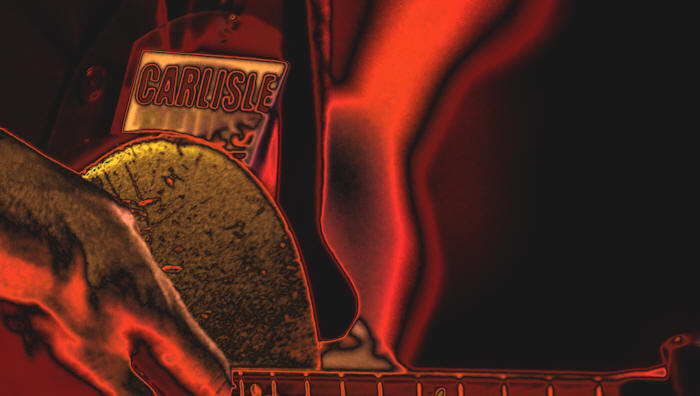
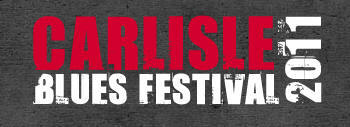
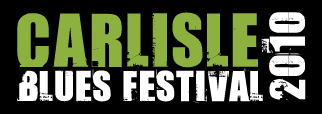
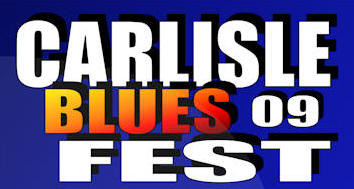
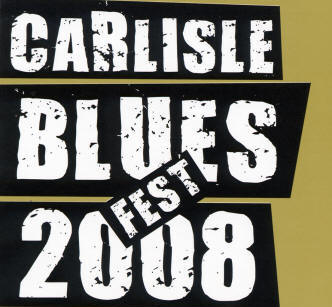
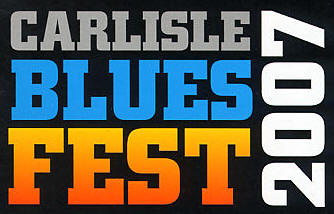
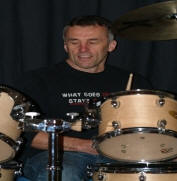 Alan: Did you have a
musical background?
Alan: Did you have a
musical background?